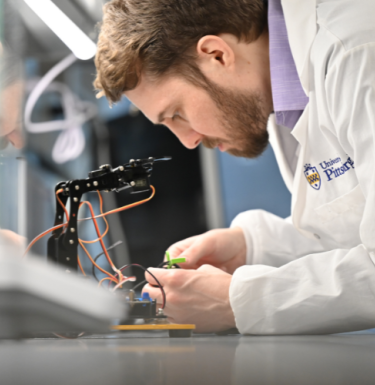
Study Reveals How the Brain Interprets Changes in Voice Pitch
In a first-of-its kind study between the University of Pittsburgh, Northwestern University and the University of Wisconsin-Madison, researchers reveal how the Heschl’s gyrus region of the brain, known for early auditory processing, plays a far greater role in interpreting speech than previously understood.
Improving Railway Safety through AI Simulation
A Pitt team used the Pittsburgh Supercomputing Center’s flagship Bridges-2 supercomputer to simulate how the increase and decrease of rail temperatures affect the vibration of the rail itself.
Building a Better Teacher: IDEA Lab is Modernizing Medical Education
Marie K. Norman, founder and director of Pitt’s Innovative Design for Education and Assessment (IDEA) Lab, believes anyone can become a better teacher. Her work moves Pitt into the forefront of cutting-edge ways to design engaging instruction for learners at all levels.
New Device for Treating Fetal Hydrocephalus Funded
A multidisciplinary team led by Stephen Emery, School of Medicine, and Youngjae Chun, Swanson School of Engineering, received $2.3M from the National Institutes of Health to fast-track the development of a device for treating fetal hydrocephalus, an accumulation of excess cerebral spinal fluid that can lead to physical disabilities or death.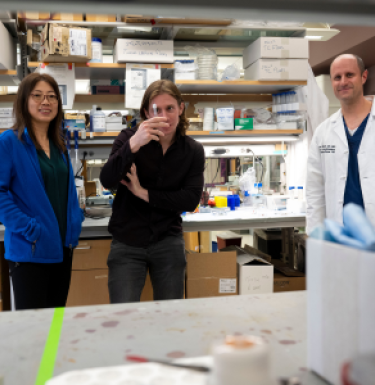
Creating a Biodegradable Nerve Stimulator to Treat Chronic Pain
Three Pitt researchers teamed up to launch Vanish Therapeutics Inc., bringing a biodegradable nerve stimulator that treats chronic pain to market. Trent Emerick, School of Medicine and Swanson School of Engineering, teamed up with Swanson researchers Xinyan (Tracy) Cui and Kevin Woeppel to create a chronic pain solution that lasts longer than a nerve block, but has fewer risks and side effects than a permanent implant.
Pitt Researchers Discuss Risks of “Mirror Bacteria”
Vaughn Cooper and Tim Hand, School of Medicine, are part of a global team of researchers that published new findings in the journal Science on potential risks from the development of mirror bacteria—synthetic organisms in which all molecules have reversed chirality (i.e. are “mirrored”).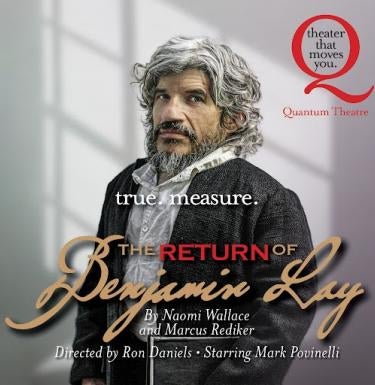
The Return of Benjamin Lay
The concept of ”history from below” is an attempt to create historical narratives built on common people’s lived experiences rather than events driven by generals, rulers, and famous names—particularly telling stories through perspective of marginalized people.

Pitt Faculty Featured in Highly Cited Researchers List
Twenty-four Pitt faculty members have been named Highly Cited Researchers™, an increase from 23 last year. The University of Pittsburgh ranks among the Top 50 global organizations by total awards received in 2024. This highlights the quality and expertise of the researchers at the University of Pittsburgh.

Pittsburgh Supercomputing Center Recognized at Annual Computing Conference
The Pittsburgh Supercomputing Center (PSC) won four annual awards presented by the computing industry publication HPCwire at the 2024 International Conference for High Performance Computing, Networking, Storage, and Analysis.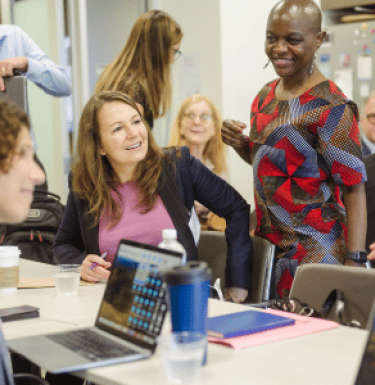
Humanities, Arts & Social Sciences Research Leaders Network Visit Pitt
The Humanities, Arts, & Social Sciences Research Leaders Network (HASS-RLN), co-organized and co-led by Shelome Gooden (University of Pittsburgh) and Christine Mallinson (University of Maryland, Baltimore County) met September 18-20, 2024. This is part of the broad efforts of HASS-RLN to promote, support, strategize and advance opportunities for humanities and humanities-adjacent research.
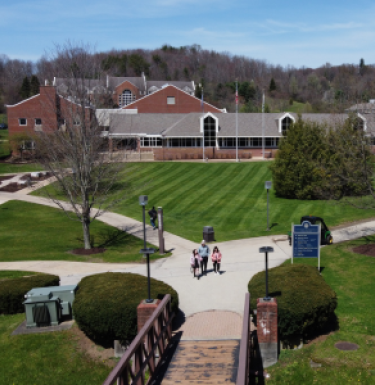
Pitt-Greensburg Acquires Nuclear Magnetic Resonance Spectrometer for Undergraduate Research
Jordan Boothe, assistant professor of chemistry at Pitt-Greensburg, was awarded an NSF Major Research Instrumentation award of $156K to acquire a Nuclear Magnetic Resonance spectrometer to support undergraduate research at UPG. The spectrometer allows students to identify molecular markers that affect the genetic characteristics of cells. This is only the fifth NSF award UPG has ever received.
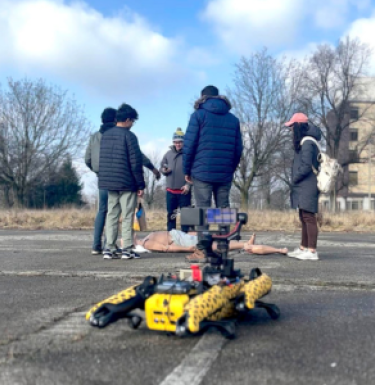
A Matter of Life or Death: Autonomous Robotic Triage System for Mass Casualty Events
University of Pittsburgh and Carnegie Mellon University researchers have developed a medical triage system using autonomous robotics that will greatly enhance medical personnel’s ability to triage patients in the field.

Pitt Awarded $13M NIH Grant for Maternal Health Research Center
Faculty from the School of Public Health and School of Medicine are leading a new effort to develop and evaluate innovative approaches to promote maternal health equity and reduce pregnancy-related complications and death.

Using Ultrasound to Boost Brain Implant Biocompatibility
A collaboration between University of Pittsburgh bioengineers and the company Actuated Medical, Inc. may bring us one step closer to measuring human brain activity more efficiently.
